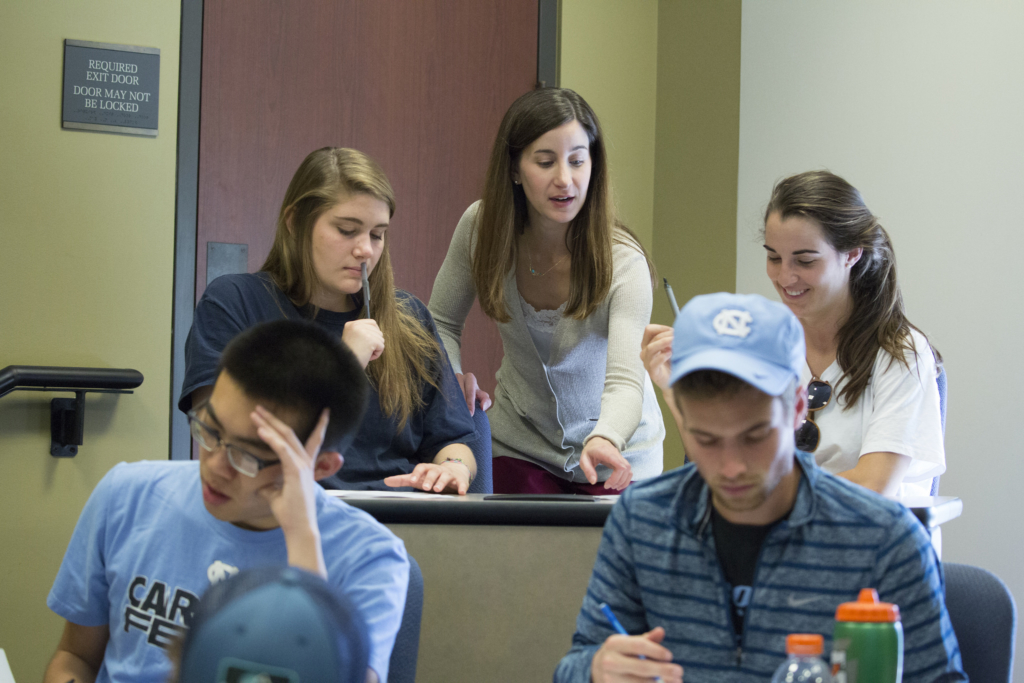
Jessica Christian, a professor at the University of North Carolina’s Kenan-Flagler Business School works with students. Photo courtesy of Kenan-Flagler
After three years as the Senior Associate Director of undergraduate business admissions at the University of North Carolina at Chapel Hill’s Kenan-Flagler Business School, Lisa Beisser says one of the biggest challenges she faces at work is turning down half the applicants who show talent, drive, and desire to join and succeed at their school.
It’s fortunate, then, that over the next eight years, Kenan-Flagler has been given the approval to increase the size of the undergraduate program by 50%. The move was passed by the university last fall, and Beisser is excited to grow the size of the program.
“It’s so difficult turning away qualified students. The growth will not lower the quality of the program because our applicant pool is that strong,” Beisser believes. “Sometimes, a student may need a nice, easy, obvious improvement like better grades, but oftentimes, it’s about being close to the top in the student pool, but not quite. Then, we encourage them to try next year.”
Prior to working in undergraduate admissions, Beisser spent 15 years working in MBA admissions. One of the things Beisser says loves best about her work is being inspired by the admissions essays of students. Despite all the articles on the incoming generation being “entitled,” she says that the essays are more often than not thoughtful and genuine, with stories of students who display mature thinking and admirable desire to contribute and give back to their community. They’re thinking beyond their own issues, needs, and borders, she says.

Lisa Beisser, director of admissions and strategic initiatives at Kenan-Flagler Business School, advises parents to help students learn from disappointment if they don’t get in. Photo courtesy of Kenan-Flagler Business School.
P&Q: What are you looking for when sifting through all the admission applications?
Beisser: At UNC, students apply to join the business school after they have completed their first year at the university. Because it’s a holistic process, each aspect is also evaluated in many ways. We not only look at a student’s grades, but specifically at their performance in quantitative courses and business prerequisites, as well as which classes they are struggling with. We’ve seen in some cases, pre-med students whose overall grades are pulled down by challenging chemistry and biology classes, where the average grade is simply lower.
When it comes to essays, successful candidates usually have a clear career focus, having considered why they want or need a business degree. It may be too much to demand that 18-year-olds have laser-sharp career focus, but we want to see them having thought about it.
On top of being evaluated through coursework, test scores, and extra-curricular involvement, the school also began requiring students to submit a video as part of the admissions interview last year. Through these visual representations, my team and I get to witness their sincerity, poise, and presentation skills. We encourage them to practice, and we can tell if they’ve put in the effort.
To top off their resumes, great candidates also show impact in their environment. They’ve accumulated work experience, not wasted their summers away, and displayed an interest in developing their business knowledge, experience, and network. While this isn’t a deal-breaker, it’s what seals the deal for an admissions offer.
What are some trends in applications, and how can students stand out?
We have three full-time staff members that I work with to decide which undergraduates receive offers. The school also hires contract readers seasonally to help review the applications they receive. With many being alumni and retirees with industry experience, it’s easy to tell when an applicant hasn’t done the thinking, work, or research to decide if business school is where they should be.
It’s pretty clear when students are being pushed by their parents to apply. These parents sometimes believe that business is where there’s an abundance of job opportunities and high salaried-positions, and that should be sufficient motivation. But that’s not what we’re looking for.
Of the thousands of applications submitted this year, I remember one in particular from an 18-year-old student in China who founded his own tutoring company. With experience leading and managing almost 400 employees, his application was extremely impressive and difficult to turn down.
We encourage students to quantify their impact. Tell us the percentage of sales you’ve increased, how many people you’ve talked to, give us context, whether it’s leadership or community service impact.
Another thing is that more students are coming into business school with a variety of international experiences. From projects they started in high school that they continue to work on, to ideas they are just starting out with, these experiences and involvements help to set apart the students we think will fit in well.
However, we are aware that not everyone has the opportunity to those kinds of experiences. And any kind of local impact is equally valuable. Some of our students have never had the opportunity to even leave North Carolina. But what we’re looking for is a mature perspective. One student showed impressive thinking and thought after working with the immigrant population in the restaurant industry. It’s not about having the grandest experiences.
Because we are constantly looking to diversify the student population and the experience of Kenan-Flagler students, we encourage underserved students who haven’t had an investment banking internship because they’ve had to take care of siblings and work, while maintaining their grades, to tell us their stories and experiences. They have to turn their stories into a value-add for our school and we want to see them succeed.
What is one of the biggest mistakes you’ve seen happen often during applications?
I’ve seen many students do themselves a disservice by leaving out their personal experiences in their essays. Without them, it’s difficult to know what makes them tick, and it’s a missed opportunity to reel in the team with a personality. Students assume that since it’s an application for business school, they should focus everything on business. We wish they’d tell us more of their story, not just about their business experiences or plans.
To tell a convincing story that will help them gain admittance to Kenan-Flagler, it’s important to begin that introspection and figure out where in business they want to be as early as possible. Seize the opportunity if you have to shadow someone in the industry, and reach out to people in all different areas of business to learn more about their work. Learn all you can about different types of business, and what skills are necessary for success. Figure out your strengths so you can work on your weaknesses here.
It’s worth it to do this homework because it gets obvious later on who’s done their practice. Even though it may be difficult to get a ‘real internship’ before entering college, any kind of exposure can be made relevant. We have some students who tell us they are going to be a camp counselor again this summer, and I tell them to not be intimidated by work experience. You can ask to be engaged in the bookkeeping, or marketing team, even while you’re a camp counselor. You need to accumulate and get transferable business skills.
Also, because of all the social media that this generation has been exposed to, they have very different communication methods that may or may not be suitable for use in the admissions process. Some applicants talk too much and try too hard to be different and creative, and it can becomes a distraction and come across as arrogance.
The other thing I’ve seen happen is applicant’s ‘meme-drop,’ and this can have a negative impact on the overall application. This is where the video component of the admissions process helps use to select the standout students. Students need to use professional judgement to determine what is allowed, and balance it with their interest and knowledge. We can tell the authenticity of a person from their video, whether they’re down-to-earth and thoughtful, or entitled and arrogant.
DON’T MISS: WHY COMMUNITY SERVICE MATTERS ON COLLEGE APPS or HBS 2+2: HOW TO APPLY TO HARVARD BUSINESS SCHOOL AS AN UNDERGRAD











Questions about this article? Email us or leave a comment below.